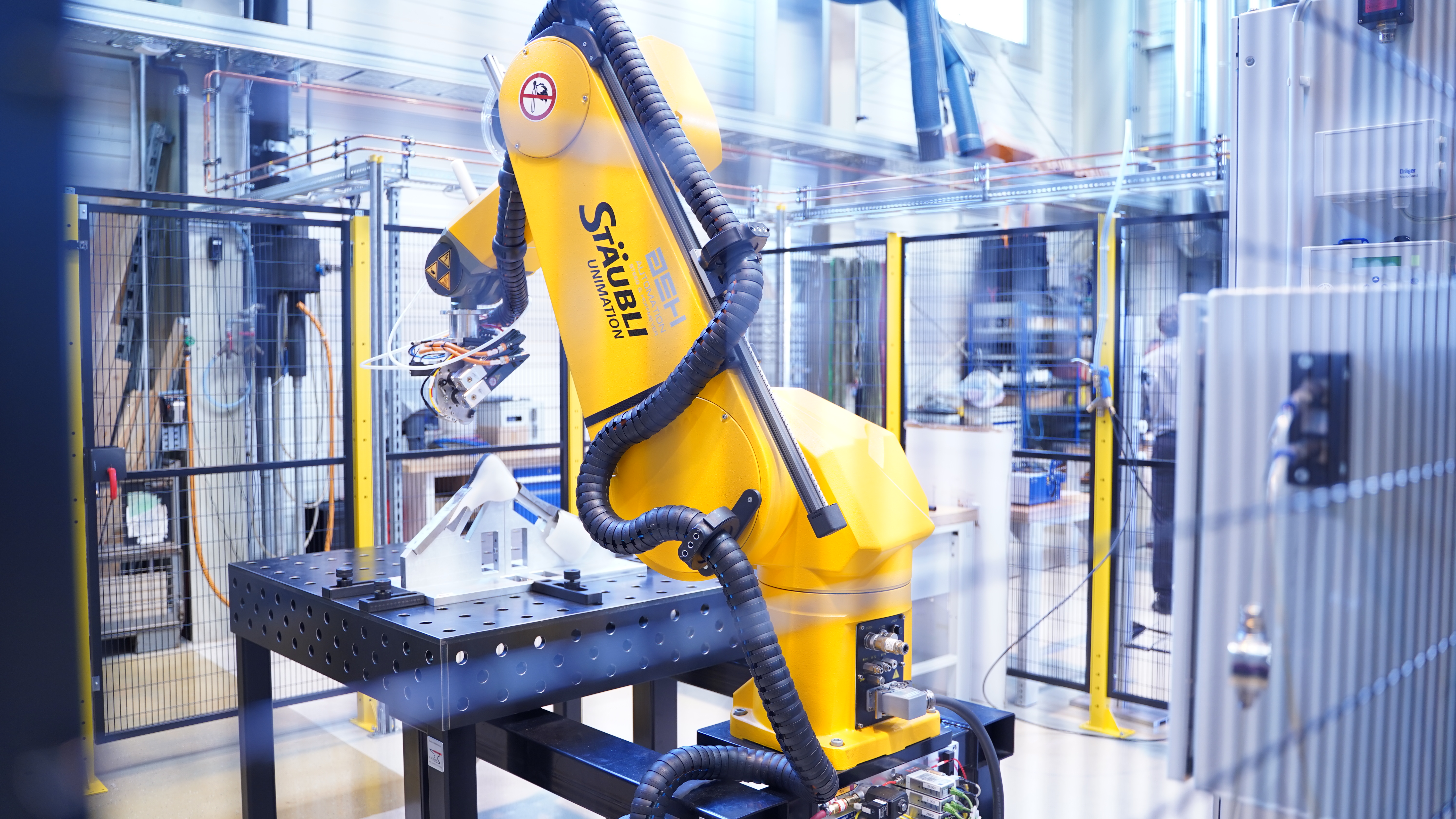Load-path-compatible and material-efficient fiber reinforcement of components through the use of UD tapes
Load-path-compatible and material-efficient fiber reinforcement of components is made possible by the use of UD tapes. If these are laid down three-dimensionally in the manufacturing process, many design options are available, especially for lightweight components that are manufactured in small quantities. In cooperation with the Fraunhofer Institute for Microstructure of Materials and Systems IMWS, the company Automation Steeg & Hoffmeyer GmbH (ASH) developed the system: F³-Compositor and successfully implemented it in the Polymer Pilot Plant Center PAZ. The innovative approach of the F³-Compositor combines tape depositing and joining of the semi-finished products with high reproducibility and material efficiency.

Lightweight construction has long been a megatrend not only for automotive production or aviation. Components that combine low weight with high load-bearing capacity are also in demand in many other fields of application. Here, thermoplastic systems based on unidirectional continuous fiber-reinforced tapes (UD tapes) offer very attractive possibilities. In these tapes, the reinforcing fibers are placed directly during manufacture in such a way that they match the load profile in the subsequent application. In this way, areas of the component that need to be particularly stable can be strengthened in a targeted manner.
3D tape laying is ideal for lightweight components that are produced in small quantities. Here, highly individual design solutions can be combined with low material consumption. One example is orthoses from the field of medical technology: These can be specifically adapted to patients using 3D tape laying, while at the same time being very lightweight and highly resilient. "For this to succeed, however, precise placement on complex and 3D-shaped geometries must be possible. This is because the deposition determines the position of the tapes and the orientation of the reinforcing fibers they contain in relation to the component. Only correct placement ensures that the desired fiber orientation and thus the desired load-bearing capacity is actually achieved in the subsequent component," says Moritz Vyhnal, who is responsible for the topic of "thermoplastic tape laying" at the Fraunhofer IMWS.
Together with the Fraunhofer IMWS, Automation Steeg & Hoffmeyer GmbH (ASH) has developed a device that ensures high reproducibility in the production of small quantities while preserving the advantages of 3D tape laying. The F3 compositor enables automated and multiaxial deposition as well as simultaneous in-situ joining of thermoplastic UD tape semi-finished products. The applied six-axis robot and laying head with integrated heat source based on an ecologically optimized hydrogen-oxygen heat source enables load-path-compliant and material-efficient fiber reinforcement of components by linear or planar depositing of tape single webs or patches with laying speeds of up to 1 m/s.
"The constant laying speed in the complex 3D space is of decisive importance for the quality of the results. We now offer a solution for this that is also very material-efficient and can be adapted for different tape widths with little effort. The material-efficient approach also makes the use of cost-intensive materials such as carbon fiber reinforcements economically feasible," says Vyhnal.
Currently, the F3 compositor in the pilot plant of the Fraunhofer Pilot Plant Center for Polymer Synthesis and Processing PAZ in Schkopau, a joint facility of the Fraunhofer Institute for Applied Polymer Research IAP and the Fraunhofer IMWS, is capable of processing tape widths from 3 mm to 12 mm. Software specially developed for this application by the company SWMS Systemtechnik enables user-friendly programming as well as process simulation of the plant by means of CAD data for material consumption, collision checking, cycle time determination and other parameters.
By the end of 2023, the pilot plant will be expanded to include a 2D lay-up machine that can lay up load-compliant, flat tape laminates with low waste. The Fraunhofer IMWS will present these technologies as well as other material and component developments at the Fakuma International Trade Fair for Plastics Processing from October 17 to 21, 2023. The institute will be represented together with Polykum e.V. at booth B2-2108.